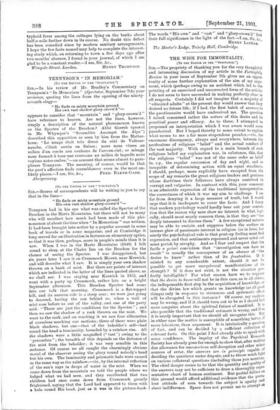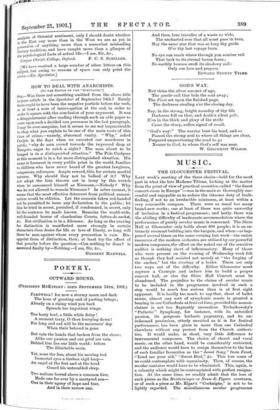THE WISH FOR IMMORTALITY. [To THE EDITOR OP THE "
SPECTATOR] SIE,—The propriety of thanking you for the very thoughtful and interesting discussion of my article in the Fortnightly Review in your issue of September 7th gives me an oppee. tunity of some further explanation of the aim of Thy argu. ment, which (perhaps owing to an accident which led to the printing of an unrevised and uncorrected form of the article) I do not seem to have succeeded in making perfectly clear in all respects. Certainly I did not imagine that a majority of " educated adults" at the present day would answer that they desired no future life ; if I had, the first batch of answers to the questionnaire would have undeceived me. The question I raised concerned rather the nature of this desire and its practical power and efficacy. As to these, I attempted to propound an interpretation which I was aware would seem paradoxical. But I hoped thereby to some extent to explain what seems to me a far more stupendous paradox,—viz., the enormous discrepancy, always and everywhere, between the urofessions of religious " belief " and the actual conduct of the vast majority. With regard to a main branch of such religious belief my explanation was, in substance, this, that the religious "belief " was not of the same order as belief in, e.g., the regular succession of day and night, and so incapable of determining action with an equal steadiness. I should, perhaps, more explicitly have excepted from the scope of my remarks the great religious leaders and geniuses whose doctrines their followers have always contrived to corrupt and vulgarise. In contrast with this, your comment is an admirable expression of the traditional interpretation, the correctness of which it was my aim to challenge. I am far from denying it a large measure of truth, but I would urge that it is inadequate to cover the facts. And I fancy that modern psychology would hardly bear out your conten- tion that the reason why men show no interest in what, logi- cally, should most nearly concern them, is that they are " too deeply interested to discuss them." A few exceptional natures may be able to sustain and suppress below the surface an intense glow of passionate interest in religion (as in love), but surely the psychological rule is that pent-up feeling must find expression, and that sentiments repressed and never acted out must perish by atrophy. And so I fear and suspect that the facile a priori conviction that " investigation can have no result" is usually the consequence of an absence of "the desire to know " rather than of its frustration. If it existed to any consderable extent, should it not be possible to get more unequivocal manifestations of its strength ? If it does not exist, is not the situation per- fectly intelligible ? For what reason have we to suppose that the desire to know will not be in this case, as in all others, the indispensable first step in the acquisition of knowledge, or that the divine law which grants us knowledge (as all good things) only in response to strenuous and systematic effort will be abrogated in this instance ? Of course, my analysis may be wrong, and if it should turn out to be so I should feel more sanguine about the spiritual future of mankind. It is also possible that the traditional estimate is wrong, and if so it is surely important that we should all recognise this. But in either case the matter is susceptible of something better, if more laborious, than argument. It is intrinsically a question of fact, and can be decided by a sufficient collection of relevant facts. On this point I feel already able to speak with some confidence. The inquiry of the Psychical Research Society has already gone far enough to show that, after making due allowance for unconscious self-deception and other minor sources of error, the answers are in principle capable of deciding the questions under dispute, and to throw much light on various collateral questions (including those you mention), The chief danger seems to be that the quantity and quality of the answers may not be sufficient to draw a thoroughly repre- sentative chart of human sentiment. But partial failure on this ground would afford additional evidence that the preva- lent attitude of men towardu the subject is apathy and sheer indifference. Space does not permit me to attempt an analysis of Oriental sentiment, only I should doubt whether in the East any more than in the West we are as yet in ion of anything more than a somewhat misleading literary tradition, and have caught more than a glimpse of the psychological facts of actual life.—I am, Sir, &c., Corpus Christi College, Oxford. F. C. S. SCHILLER.
[We have received a large number of other letters on this subject, but owing to reasons of space can only print the above.—En. Spectator.]







































 Previous page
Previous page